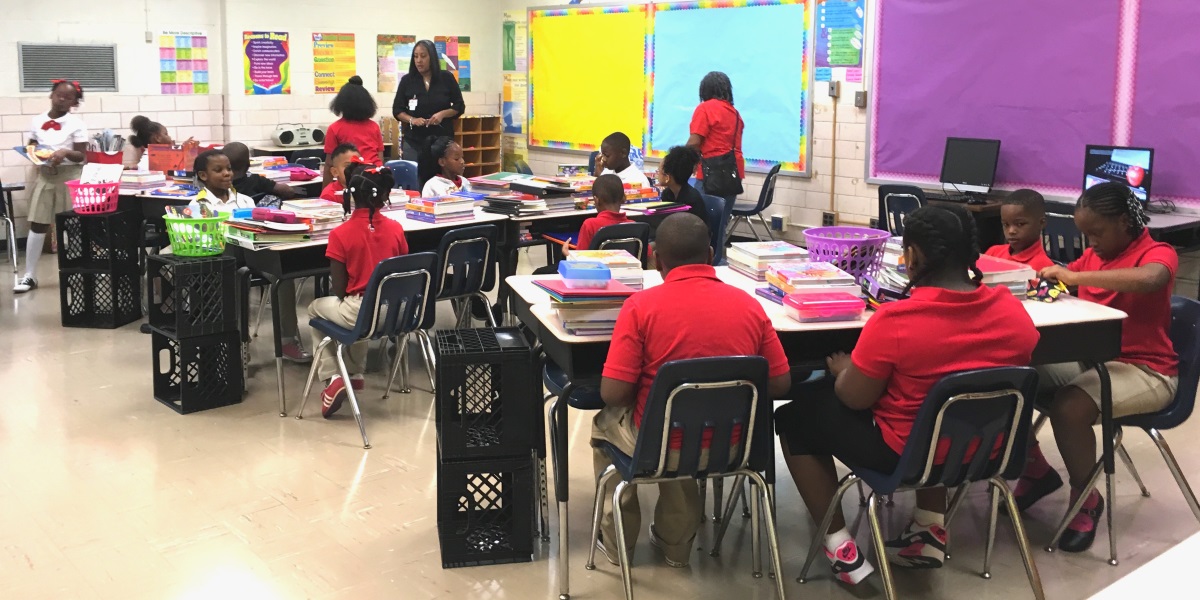The Battle Behind Ga.’s Proposed Opportunity School District

Martha Dalton / WABE
Hear the broadcast version of this story.
When Georgia voters head to the polls next month, in addition to picking their choice for president and U.S. Senate, they’ll be asked to vote on a measure called “Amendment One.” The proposal is also known as Gov. Nathan Deal’s school takeover plan. It would create an Opportunity School District to manage schools the state deems “chronically failing.”
But opposition to the proposal has been steadily growing. Those who are against the plan say it would interfere with local control of schools.
What Is A ‘Failing’ School?
Some critics also disagree with the criteria that would determine which schools are “failing.”
“By definition, that is schools that for three or more consecutive years, have never scored more than a 60 on our state rating system,” Deal said at a recent education conference in Atlanta.
The state rating system, also known as the College and Career Ready Performance Index, evaluates schools using benchmarks like attendance, standardized test scores and graduation rates.
Using that system, a recent list issued by Deal’s office identifies 127 “chronically failing” schools in Georgia.
But critics of the takeover plan are quick to point that the CCRPI is slightly different every year.
“We’re changing the metrics all the time,” said Georgia Parent Teacher Association President Lisa-Marie Haygood. “It’s not been the same ever in the state of Georgia.”
The Georgia PTA publicly opposes the takeover plan.
“What does it do for us if we allow a constitutional amendment to be passed and then the state Legislature changes the bar that we have to meet?” Haygood said.
The governor admits it’s hard to know if the rating system is the best way to figure out if a school is “failing.” But he also says the state can’t turn a blind eye to struggling schools.
“We have almost 68,000 Georgia students who are required by law to attend a chronically failing school,” Deal said.
Bipartisan Resistance
The Georgia PTA is one of a growing number of groups that disagree with the governor’s plan. For Haygood, it’s not a partisan issue. In fact, she’s a conservative who campaigned for Deal. She’s in an uncomfortable spot.
“This is super hard for me,” she said.
Haygood believes local communities should run their schools, not the state. The same is true for Dan DeLamater, a father of two, fellow conservative, and member of the new group the Committee to Keep Georgia Schools Local. He also opposes the plan.
“First, it is a weakening of local control,” he said. “It is, secondly, an expansion of bureaucracy because this would create a tertiary leadership position for education in Georgia.”
The new leadership position DeLamater’s talking about is the superintendent of the Opportunity School District. That person would run the schools the state takes over and would be appointed by — and accountable to — the governor. DeLamater said that’s a stark contrast to local officials, who are accountable to voters.
“If we don’t like things that are happening at our local level, we can vote out or vote against our local school board member,” he said. “If we don’t like things happening at that state level, we can vote against or for someone in that state superintendent’s role.”
The legislation enabling the OSD says local communities will be involved in decision-making for schools the state takes over. Some critics think that language is too vague; DeLemater says the pledge is disingenuous.
A Struggle For Control
Despite his critics’ cries about losing control of schools, Deal insists the plan is meant to help.
“When these people say, ‘Well, the governor’s just trying to take over our system.’ If you hear one of those people say that, ask them this question: ‘Is your child, or your grandchild, or any of your relatives enrolled in one of those chronically failing schools?’” the governor said. “I can almost guarantee their answer is going to be, ‘No.’”
But some local boards of education say they want to be the ones to intervene if their schools are struggling. Several have officially opposed the governor’s plan. In the Atlanta area, that includes the DeKalb, Clayton, Cherokee, Newton and Rockdale county school districts.
The takeover plan will only become law if voters approve Amendment One next month.
9(MDAxODM0MDY4MDEyMTY4NDA3MzI3YjkzMw004))








